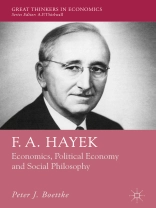This book explores the life and work of Austrian-British economist, political economist, and social philosopher, Friedrich Hayek. Set within a context of the recent financial crisis, alongside the renewed interest in Hayek and the Hayek-Keynes debate, the book introduces the main themes of Hayek’s thought. These include the division of knowledge, the importance of rules, the problems with planning and economic management, and the role of constitutional constraints in enabling the emergence of unplanned order in the market by limiting the perverse incentives and distortions in information often associated with political discretion. Key to understanding Hayek’s development as a thinker is his emphasis on the knowledge problem that economic decision makers face and how alternative institutional arrangements either hinder or assist them in overcoming that epistemic dilemma. Hayek saw order emerging from individual action and responsibility under the appropriate institutional order that itself emerges from actors discovering new and better ways to coordinate their behavior. This book will be of interest to all those keen to gain a deeper understanding of this great 20th century thinker in economics.
Tabela de Conteúdo
Chapter 1: Clarifying Some Misconceptions About Hayek.- Chapter 2: Hayek: An Overview of His Life and Work.- Chapter 3: The Anatomy of an Economic Crisis: Money, Prices and Economic Order.- Chapter 4: Hayek on Market Theory and the Price System.- Chapter 5: Hayek and Market Socialism.- Chapter 6: The False Promise of Socialism and The Road to Serfdom.- Chapter 7: A Genuine Institutional Economics.- Chapter 8: The Political Economy of a Free People.- Chapter 9: Hayek, Epistemics, Institutions, and Change.- Chapter 10: The Reconstruction of the Liberal Project.- Chapter 11: The Hayekian Legacy.
Sobre o autor
Peter Boettke is University Professor of Economics and Philosophy, Director of the F. A. Hayek Program for Advanced Study in Philosophy, Politics, and Economics, at George Mason University, USA.












